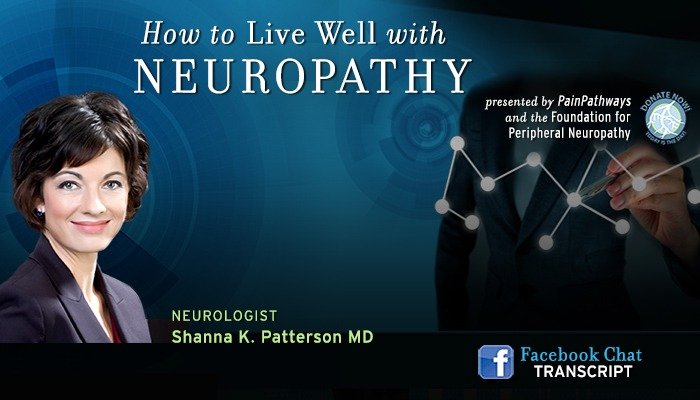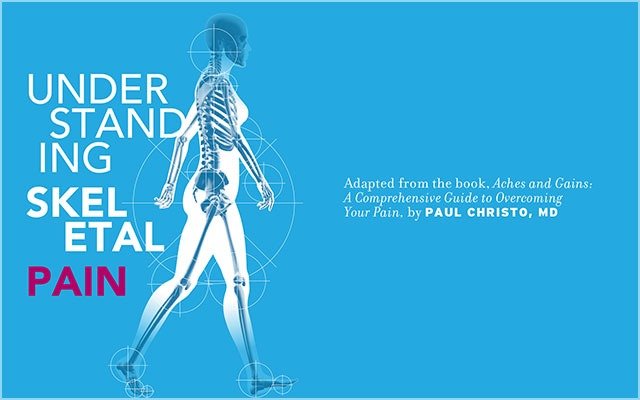Neuropathy Facebook Chat

Transcript Highlights
Shanna K. Patterson, MD, and The Foundation for Peripheral Neuropathy
May 20, 2015
Welcome! Thank you for joining us today for “How to Live Well with Neuropathy.” This Facebook chat will be hosted by Dr. Shanna Patterson and The Foundation for Peripheral Neuropathy and will cover topics such as:
– Power of attitude
– Exercise and physical therapy
– Self-care and coping skills
– Timing and side effects of neuropathic pain medications
– The importance of sleep
– Footwear & anticipating challenges for sure footing
Dr. Patterson is currently the director of electromyography (EMG) at Mount Sinai Roosevelt Hospital, and an assistant professor of neurology at the Icahn School of Medicine at Mt. Sinai in New York City, and a member of the Foundation for Peripheral Neuropathy’s advisory board.
In her practice, Dr. Patterson sees patients for initial diagnoses as well as in-depth assessments of idiopathic neuropathy. Her approach focuses on trying to find an underlying cause for a patient’s neuropathy, which can then be addressed, while also helping patients to maximize their quality of life through pain management and lifestyle techniques. She is passionate about patient education and empowering patients to find new ways to live their lives to the fullest.
We also have the Foundation for Peripheral Neuropathy on our chat with us tonight. They’ll also be able to answer questions you may have about the foundation and foundation membership. https://www.foundationforpn.org/index.cfm
PainPathways Magazine: Now, please join us in welcoming Dr. Patterson!
Dr. Patterson: Good evening everybody! It is a pleasure to be here tonight. I look forward to answering your questions.
Dawn: Hello, and thank you very much for volunteering your time to help us learn more.
William: Thanks for being here.
PainPathways Magazine: So, let’s get started with your questions! Please post your question as a NEW post – not as a comment to this post. This will help us keep track of questions. We’ll jump in with responses – so be patient and just keep refreshing your screen.
Hank: I would like to know if Lyrica is medicine you should take or not take. I use 3 x 150 mgrp.
Dr. Patterson: Thank you for your question. Lyrica is a medication used to treat painful symptoms associated with neuropathy. It does not heal the nerves themselves, and may not help weakness or feelings of numbness due to neuropathy. However, for many people, it is very effective in treating painful or burning sensations. Often it is taken on a daily basis for best effects. Some people notice that it also helps their symptoms if taken occasionally, as opposed to on a daily basis. For every medicine, there is a balance between seeing how much it helps you, with any possible negative side effects. Some people notice feelings of sleepiness or dizziness with Lyrica, but many people do well with the medication, especially if the dose is started low and gradually increased. If it does cause you to feel groggy, you can talk to your doctor and try taking most or all of it before bed. (This can also be a good strategy if most of your pain is at night.) I hope this helps!
Pam Shlemon/TFFPN: To learn more about the treatments visit FPN’s website at https://www.foundationforpn.org/livingwithperipheralneuropathy/
Barry: I understand that hyperbaric oxygen therapy (hbot) has been used to treat neuropathy. What is Dr. Patterson’s opinion of this? Pros and cons? To what level of atmospheric pressure does one need to go for best results?
Dr. Patterson: Thank you for your question. It is exciting to see how much research is going on in terms of neuropathy treatment. However, hyperbaric oxygen therapy has not been shown in scientific clinical trials yet in humans to help treat neuropathy. In my opinion, it would be best to stay tuned and see how this research evolves, prior to recommending it to patients.
Michael: Is anyone aware of any studies, research on post polio syndrome and peripheral neuropathy? I’d had polio as a baby some 60 years ago. After my last, of two, total knee replacements on left and right legs pain symptoms began showing up. Had to stop working last year September due to the severity of pain in both legs and feet. Now on disability and pain management…Having worked at a hospital last 9 years, used all resources available yet found no permanent answers. Tried many drugs and supplements.
Dr. Patterson: In response to Michael D.’s question regarding post-polio and neuropathy: There is no known connection between polio and neuropathy. Polio involves certain nerves cells that are responsible for movement and connect to muscles, but not nerves that relate to sensation or pain. However, it could be that the “mechanics” of your legs if affected by polio might be more susceptible to recovering differently from other problems, such as those you describe. Perhaps this could be a related set-up for your pain? I would suggest involving a neurologist in your care if you haven’t already. I wish you the best of luck.
PainPathways Magazine: Thanks for your patience everyone! If you have people in your life who need to know the basics on neuropathy, we have an article on our website that might be helpful to create some general understanding: https://www.painpathways.org/unraveling-the-mystery-of-neuropathy-to-manage-the-illness/.
Dawn: Are all types of neuropathy treated the same? Is there a general prognosis and way of treating/living well with idiopathic small fiber neuropathy? Since this is not a muscle problem, will consistent exercise build up my nervous system in order to handle more movement?
Dr. Patterson: In response to Dawn’s questions regarding whether all types of neuropathy are treated the same, and how to treat/live well with idiopathic small fiber neuropathy: In general I like to think of two “branches” of neuropathy treatment. On one hand, we try to find the cause of neuropathy, and if we are able to find a cause, then sometimes this allows us to target treatment accordingly. (For example, if the neuropathy is due to a vitamin deficiency you treat it with vitamin supplements, etc.). In addition, there is the question for every patient with neuropathy of doing the best to treat the symptoms. For those with weakness or imbalance, physical therapy and exercise can be important. It can be important to wear shoes with good traction, and shoes that are comfortable. Some people find it helps to keep their feet warm. Pain medications (oral or topical creams or patches) can be used. It is important to stay well-rested and to focus on treatments at night if your pain is worse then.
For isolated, idiopathic small fiber neuropathy the prognosis is varied – in some cases, it resolves on its own, and in some cases, it persists unchanged or worsens. Sometimes it can progress to involve other types of nerves. However, some exciting research lately suggests that in some patient’s regular exercise, weight loss, and a healthy diet can actually help reverse small fiber neuropathy, especially in patients with borderline diabetes, high cholesterol, and obesity. I’ve included some links below with interesting information on exercise and diet/lifestyle resources that I hope might be helpful for you and others. Wishing you well!
Kay: Can we look forward to some evidence-based research for complementary medicine — acupuncture, tai chi, yoga, massage, etc. — so doctors will recommend it and insurance companies will pay for it?
Pam Shlemon/TFFPN: There is evidence-based research on some complementary therapies such as tai chi for balance, acupuncture for Chemo-induced neuropathies. You can visit our website at https://www.foundationforpn.org/living-well-with-peripheral-neuropathy/?p=1&ref=/living-well-with-peripheral-neuropathy/complimentary-integrative-therapies/index.cfm to learn more.
PainPathways Magazine: Also, we just had an article about tai chi in our recent newsletter. If you become a member, you can get access to this. Become a member at: https://www.foundationforpn.org/.
Olga: What are the symptoms of neuropathy of the feet when you do not have diabetes? Can it cause it by using ice packs for several weeks because of tendonitis and other conditions (OA, hallux rigidus/valgus, initial Sudeck)?
Dr. Patterson: There are many causes of neuropathy aside from diabetes, and the symptoms are often quite similar even if the causes are different. These can include numbness, tingling, burning, other funny feelings, problems with balance, or muscle weakness over the affected area. Under normal conditions nerves should not sustain damage from using ice packs, although your foot might feel numb from the ice itself.
Lori: What are some exercises that will help neuropathy?
Dr. Patterson: In response to Laurie R’s question regarding exercise for neuropathy: This is an interesting question. I would say if your neuropathy causes you to have weakness, then strengthening is important. If you have balance trouble, then physical therapy to work on balance is crucial, (and also wearing shoes with good traction, using caution with slippery surfaces, and a handlebar in your shower to hold when you close your eyes). If you have a “milder” painful sensory neuropathy some research has shown benefits with regular cardiovascular exercise, which in some cases can help improve systemic inflammation and borderline diabetes and even reverse some forms of neuropathy. One of the studies recommended 150 minutes of cardiovascular exercise (“heart rate up and breaking a sweat”), probably spread over 4-5 days per week. One important thing to remember is that exercising does NOT hurt your nerves or cause your neuropathy to worsen, even though for some people pressure on their feet makes it feel worse. I hope this helps!
Theresa: I have been reading lately about vitamins B1 and B6 for neuropathy. Was wondering if this two help at all and if so what dosage amount?
Dr. Patterson: Thank you for your question. You raise an excellent point. There are a number of B vitamin deficiencies, including B1, B6, and B12, that have been definitely shown to cause neuropathy, but only when you have a deficiency. So, if you have normal levels of these vitamins, which most healthy people do through a balanced diet, then according to our current understanding, having “extra high” vitamin levels will not help either in preventing or treating neuropathy – in fact too much vitamin B6 can actually cause certain types of neuropathy. If you think you have a problem with your health that causes you to not absorb vitamins or other nutrients well, you should talk with your doctor.
William: Anodyne therapy. Your opinion, doctor?
Dr. Patterson: Hello. in response to the question regarding anodyne laser therapy: Unfortunately there have not been human clinical trials showing benefit in the treatment of neuropathy, so it is not something I would recommend personally. There is a lot of ongoing research looking for medication or treatment that might reverse nerve damage in most types of neuropathy, but unfortunately, we have not found it yet. Hopefully, in the future, we will.
PainPathways Magazine: Here’s an article from our magazine that ties in with some of the therapies we’ve been talking about – bookmark it to read after the chat: https://www.painpathways.org/microcurrent-point-stimulation-2/
Vicki: I have idiopathic neuropathy. I have been unable to tolerate any of the medications used. Is there anything new on the horizon? I get pain in my abdomen that is very hard to tolerate.
Joan: I would like to know your feeling about the 2012 High Dose Fluzone. 10 days after the vaccine I developed burning and sensation of wetness in my face arms and legs. None of the meds have helped; only help comes if I am in direct sunlight.
Dr. Patterson: In response to Vicky’s and Janet’s questions regarding idiopathic neuropathy: Thank you for your questions. Idiopathic neuropathy of course means a neuropathy condition, which we have not found the cause for. It can be frustrating to have a condition and not know what’s causing it, and also can be frustrating from a medical standpoint because in some cases if we know the cause of neuropathy that leads us to a treatment for a patient. Idiopathic neuropathy is quite common. Depending on the type of neuropathy studies generally state that anywhere between 25% and 40% (for isolated small fiber neuropathy) of patients have “idiopathic” neuropathy. Sometimes it can be worth seeing a neuropathy specialist if you have been diagnosed with idiopathic neuropathy because specialists can sometimes investigate further with certain tests and find a possible cause for your condition. In addition, there are some interesting recent studies recently that suggest “metabolic syndrome” (or a combination of obesity, high cholesterol, and possibly borderline diabetes) may itself lead to a subtle type of systemic inflammation that can contribute to neuropathy. In those cases, regular exercise and a healthy diet and weight loss can actually help reverse mild neuropathy. I would suggest seeing a neuropathy specialist at least for a consultation if you have idiopathic peripheral neuropathy. Wishing you both the best, and I hope this helps.
PainPathways Magazine: http://www.painresearchforum.org/news/48905-treating-neuropathic-pain-cannabis-pro-and-con.
Valerie: I have neuropathy in my feet but I am not diabetic. What works to relieve the cold feeling and the pain?
Dr. Patterson: Thank you for your question. First I would suggest talking to your doctor, or a neurologist or neuropathy specialist, to try and see if the cause for your neuropathy can be identified. Sometimes it can be reversible, in which case your pain may go away permanently. However, to treat your pain, there are a number of things that might help. Some people notice that keeping their feet warm or wearing comfortable, cushioned shoes helps. Some studies have shown that for some people, especially those who don’t exercise regularly, starting a regular exercise routine helps. Others need medication, and in some cases various prescription or over-the-counter numbing creams, ointments or patches can be helpful (especially if your pain is only over your feet). If none of this helps, then there are a variety of oral medications that work specifically on neuropathy-related pain. You should talk to your doctor to decide which option is right for you.
Roger: Is there ongoing or planned research for a cure for peripheral neuropathy?
Pam Shlemon/TFFPN: There are many research projects taking place across the country and in Europe to identify biomarkers and to find effective therapies. The Foundation for Peripheral Neuropathy established a Peripheral Neuropathy Research Registry (PNRR) that is collecting phenotypic and genotypic information on patients across the country. This data will help researchers find new treatments and one day a cure.
PainPathways Magazine: Several people have asked about finding a physician who can treat neuropathy – this website may be a good starting point: https://patients.aan.com/findaneurologist/.
PainPathways Magazine: Also, to find a board-certified pain specialist, here is a good starting point: http://www.abpm.org.
Monica: Can neuropathy progress the longer you have it? Mine started in feet but now I can feel the tingling in my calves up to the point that my knees feel numb.
Dr. Patterson: That is a great question that I am sure is on many peoples’ minds. The answer is not clear-cut – how neuropathy changes over time is highly variable between different people. Depending on what is causing the neuropathy, and a variety of factors, in some people it can progress slowly or quickly, stay essentially the same over many years, or even gradually improve (especially when it is relatively mild). In your case, it does sound like the neuropathy could be worsening because you now have symptoms over previously unaffected parts of your legs. I would talk with your doctor or neurologist to evaluate things further, as soon as possible.
PainPathways Magazine: Foundation for The Foundation for Peripheral Neuropathy has two levels of membership that will give you access to GREAT information. Please plan to check out their website after the chat:
Dr. Patterson: I would like to take a minute and talk about the treatment of pain related to neuropathy, which is something we are seeing a number of questions about tonight. This is a very common issue. In my experience, there is a wide variety of ways to manage pain related to neuropathy, AND in every case, treatment depends on a balance between finding approaches or medications that help you, without causing side effects that cause more problems. This can be a process that involves working with your doctor and making gradual adjustments over time.
For some people, simple changes in their lifestyles can help. For example, some people notice pain in their feet is worse while wearing tight shoes, so wearing more comfortable shoes is important. Some find that keeping their feet warm help. Many people find that their foot pain is worse at night, and it’s not true that your neuropathy is worse at night, but it is probably the case that our amazing minds are less distracted by other stimuli and things going on, so we notice it more, and it interferes with our ability to relax and fall asleep. If you become chronically sleep deprived, or depressed because you are in chronic pain – both of these things can make your pain feel worse. Sometimes choosing pain medications that include lethargy as a side effect and taking them at bedtime can be a great option for these individuals. In addition, some neuropathy pain medications are also actually anti-depressants, and this can be useful for people with symptoms of depression.
For some people, biofeedback or meditation, or other mindfulness or relaxation techniques help with the pain. Especially for patients with pain localized to one part of their bodies (feet most commonly). Topical preparations – either ointments or patches – can be great for finding relief without risking systemic side effects. Many oral pain medications are useful, and there is a large variety available now. I encourage you to work with your neurologist to help you choose which one and at what dose.
Finally, many people are curious about the role of marijuana in treating pain. It is true that the cannabinoid receptors on nerve cells are a likely great newly recognized target for the treatment of many types of pain. I have included a link below that I think highlights some of the controversy and promise in this area. I hope this information helps!
Ravi: What is the role of lasers, acupuncture, TENS, ankle nerve blocks, and alternative medicine? I am an MD and have patients.
Dr. Patterson: You raise some excellent questions. None of what you mention has been shown in scientific, clinical trials in humans to cure neuropathy. In terms of helping the symptoms, there is some literature that suggests acupuncture might help pain temporarily for some people. Some people also notice that massage helps their feet feel better if they have neuropathy. I would not advise nerve blocks at the ankle for neuropathy – even if it helped the pain, it could cause foot numbness or muscle weakness depending on which nerve was being blocked. TENS can help temporarily alleviate painful symptoms, although it might be difficult to use over feet (as opposed to back or shoulders with more muscle tissue). Also, TENS might be irritating for people who have hypersensitive feet due to their neuropathy.
PainPathways Magazine: Ravi – We have several patients who have found some relief from acupuncture and other forms of complementary therapies. While there are limited clinical trials in this area, patients have found some help. You can also direct your patients to our website to learn more about the therapies. https://www.foundationforpn.org/living-well-with-peripheral-neuropathy/?p=1&ref=/living-well-with-peripheral-neuropathy/complimentary-integrative-therapies/index.cfm.
Laurie: What type of exercise is best for neuropathy in the legs?
Dr. Patterson: Thank you for your question. In general, exercise is good for people who have neuropathy (and of course for people who don’t). For some people who are obese and do not exercise, starting a regular cardiovascular “cardio” exercise program and losing weight may even help reverse your neuropathy with time. Exercises that also help with balance can be very useful. If you have numbness in your feet I would avoid using a treadmill, because if you trip it can be hard to catch yourself, and you could be at a higher risk of falling. If you notice that wearing tight shoes or feeling a direct impact on your feet is painful, I suggest trying swimming as well, if that is an option for you.
Laurie: My ankles are getting swollen off and on. Just wondering if that’s from the neuropathy. Sometimes they are swollen after my doing nothing but sitting around.
Dr. Patterson: Usually ankle swelling is not caused by neuropathy, but sometimes if your lower leg and foot muscles are weak from neuropathy, this can cause more sluggish circulation and contribute to some swelling. Also, if you notice that it’s hard for you to walk due to your neuropathy, and you sit a lot, the combination of lack of activity and the effect of gravity (while sitting in a chair) can cause some fluid retention around your feet and ankles. You should talk with your doctor to make sure there is no other possible cause for this condition, such as heart disease or primary problems with circulation. For some people, it can be very helpful to elevate your feet as much as possible, and also to wear support stockings. I hope this helps.
Dr. Patterson: Some people have questions regarding exercise and neuropathy, which is great. It is not true that you can heal nerves specifically through exercise – however, exercise definitely helps in a number of ways for neuropathy. If you don’t exercise at all, then you absolutely should try to start a regular exercise program, because if you are not exercising then you could probably be stronger with exercise, even if you have neuropathy, and this can help you feel better. If you do exercise or physical therapy that involves balance that helps your balance – even if your nerve endings are not working perfectly you can train other muscles and parts of your brain to achieve better balance.
Some studies of patients who were obese had borderline diabetes and high cholesterol and isolated small fiber neuropathy found that with regular cardiovascular exercise their symptoms and neuropathy actually improved – as they lost weight and their blood sugar measurements improved at the same time. Also, for some patients with mild autonomic symptoms including dizziness, persistent cardiovascular exercise can “train” the part of your nervous system that relates to blood pressure and heart rate and help your symptoms with time. There is no easy “pill” unfortunately that has the same benefits of exercise, but studies have shown that exercising with a friend can make a big difference, and make you more likely to stick with your exercise regimen. Also, below I am including a link to a great book with different exercise approaches for different health problems. I hope all this helps. Best of luck!
Suzy: I don’t have a confirmed diagnosis of PN yet. My podiatrist has ordered a nerve biopsy to check for small fiber neuropathy. I’m worried because no one can find anything wrong with my feet. Why are they so painful? They have all the classic neuropathy symptoms. Blood work is all good and I’m not a diabetic.
Dr. Patterson: Thank you for sharing your situation and I am sorry to hear about everything you are going through. In terms of your feet, it sounds like you do have neuropathy-like symptoms there. Testing to confirm the presence of neuropathy usually starts with EMG/Nerve Conduction Studies (NCS), which involves stimulating the nerves and seeing whether they respond normally, and testing muscle activity (since muscles depend on connections to healthy nerves to function). If that test is negative, sometimes people have a skin biopsy, to test for the smallest nerve fibers that are in your skin. In some cases, the skin biopsy is the only test that confirms the presence of neuropathy. Once the diagnosis of neuropathy is confirmed, you can potentially see a neurologist or neuropathy specialist try and search for more rare causes of your condition, if needed. If the testing for neuropathy is all negative, then it may be important to coordinate with your providers, such as neurologist, podiatrist, and possibly orthopedic foot specialist to look for other possible causes of foot pain.
PainPathways Magazine: Everyone, our time is unfortunately up. We appreciate all of your thoughtful questions and our experts’ informative responses. This has been a great dialogue, and we are excited to have another Facebook chat soon!
Professional and Individual subscriptions to
PainPathways Magazine
The magazine is available at www.PainPathways Magazine.org.
All information provided is for educational purposes only. Neither PainPathways Magazine nor their Facebook Chat hosts are responsible for a medical diagnosis. Individuals should seek a physician for evaluation and a personalized treatment plan.
PainPathways Magazine
PainPathways is the first, only and ultimate pain magazine. First published in spring 2008, PainPathways is the culmination of the vision of Richard L. Rauck, MD, to provide a shared resource for people living with and caring for others in pain. This quarterly resource not only provides in-depth information on current treatments, therapies and research studies but also connects people who live with pain, both personally and professionally.
View All By PainPathways






